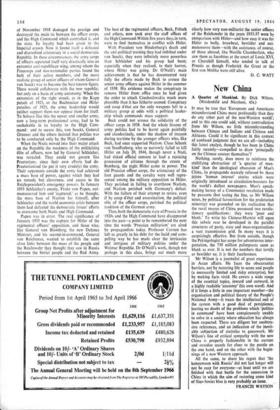New China
Ir may be true that 'Europeans and Americans misunderstand China more profoundly than they do any other part of the non-Western world'; and to this one could add, without contradiction from Mr Wilson, no little misunderstanding between Chinese and Indians and Chinese and Africans. Could it be significant in this context of confused judgment that we are all—including this latest analyst, though he has been in China fairly recently—compelled to draw 'principally on the Chinese sources themselves'?
Nothing, surely, does more to reinforce the stultifying abstraction of 'a quarter of man- kind' than the ideological obsession of Mao's China, its propaganda scarcely relieved by those jejune 'human interest' stories which were originally introduced as circulation-boosters for the world's dullest newspapers. Mao's epoch- making heresy of a Communist revolution made by peasants (but toeing the line, as Mr Wilson notes, by political favouritism for the proletarian minority) was grounded on his realisation that the rural masses of China possessed two revolu- tionary qualifications : they were 'poor and blank.' To write his Chinese-Marxist will upon this tabula rasa he developed in the parallel structures of party, state and mass-organisations a vast transmission grid. In many ways it is surprisingly effective. But from outside, though the Pekingologist has scope for adventurous inter- pretation, the 730 million palimpsests seem as blank as ever. It is not the numbers that terrify or bewilder us; it is their facelessness.
Mr Wilson is a journalist of great experience
in Asian affairs. He faces the obscurantist barriers, not by restoring life to scene and people (a necessarily limited and risky enterprise), but by making facts vivid. He covers a wide range of the essential topics, inward and outward, in a highly readable 'anatomy' (his own word). And if it limps a little in one important member—the organisation and political theory of the People's National Army—it treats the intellectual end of the system with a good deal of percipience, leaving no doubt of the problems which 'politics in command' have been conspicuously unable to solve in a society where education has always been respected. There are diligent but unobtru- sive references, and an indication of the inevit- able subjection of statistics to guesswork. Mr Wilson's line of critical sympathy with the new China is properly fashionable in the current and overdue search for clues to the puzzle on the one hand, and on the other with the begin- nings of a new Western approach.
All the same, to share his regret that 'the honeymoon with Russia' did not last longer will not be easy for everyone—at least until we are finished with that battle for the succession in China in which the aim of restoring some kind
of Sino-Soviet bloc is very probably an issue. .
FRANCIS WATSON






























 Previous page
Previous page